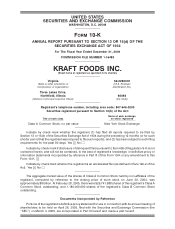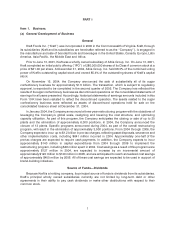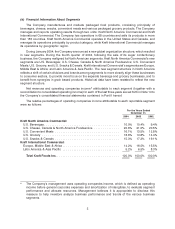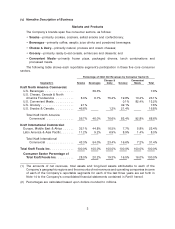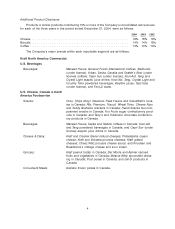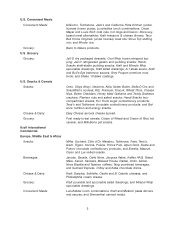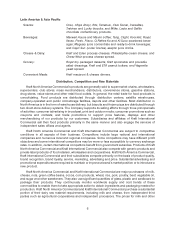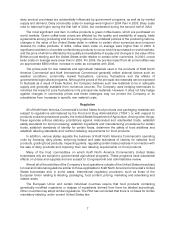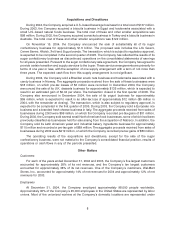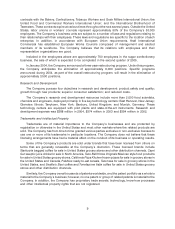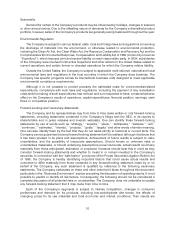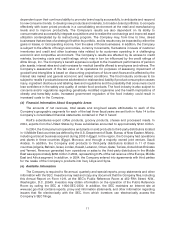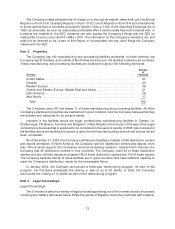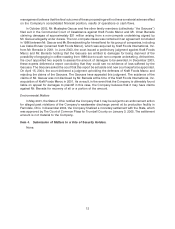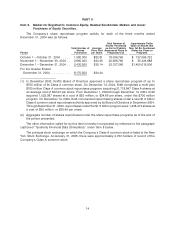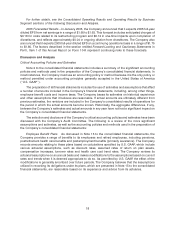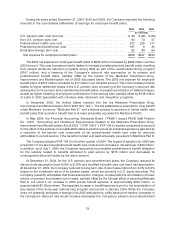Kraft 2004 Annual Report Download - page 10
Download and view the complete annual report
Please find page 10 of the 2004 Kraft annual report below. You can navigate through the pages in the report by either clicking on the pages listed below, or by using the keyword search tool below to find specific information within the annual report.contracts with the Bakery, Confectionery, Tobacco Workers and Grain Millers International Union; the
United Food and Commercial Workers International Union; and the International Brotherhood of
Teamsters. These contracts expire at various times throughout the next several years. Outside the United
States, labor unions or workers’ councils represent approximately 50% of the Company’s 53,000
employees. The Company’s business units are subject to a number of laws and regulations relating to
their relationships with their employees. These laws and regulations are specific to the location of each
enterprise. In addition, in accordance with European Union requirements, Kraft International
Commercial has established European Works Councils composed of management and elected
members of its workforce. The Company believes that its relations with employees and their
representative organizations are good.
Included in the employees above are approximately 700 employees in the sugar confectionery
business, the sale of which is expected to be completed in the second quarter of 2005.
In January 2004, the Company announced a three-year restructuring program. Under this program,
the Company anticipates the elimination of approximately 6,000 positions. Specific programs
announced during 2004, as part of the overall restructuring program, will result in the elimination of
approximately 3,500 positions.
Research and Development
The Company pursues four objectives in research and development: product safety and quality;
growth through new products; superior consumer satisfaction; and reduced costs.
The Company’s research and development resources include more than 2,000 food scientists,
chemists and engineers, deployed primarily in five key technology centers: East Hanover, New Jersey;
Glenview, Illinois; Tarrytown, New York; Banbury, United Kingdom; and Munich, Germany. These
technology centers are equipped with pilot plants and state-of-the-art instruments. Research and
development expense was $388 million in 2004, $374 million in 2003 and $354 million in 2002.
Trademarks and Intellectual Property
Trademarks are of material importance to the Company’s businesses and are protected by
registration or otherwise in the United States and most other markets where the related products are
sold. The Company has from time to time granted various parties exclusive or non-exclusive licenses to
use one or more of its trademarks in particular locations. The Company does not believe that these
licensing arrangements have had a material effect on the conduct of its business or operating results.
Some of the Company’s products are sold under brands that have been licensed from others on
terms that are generally renewable at the Company’s discretion. These licensed brands include
Starbucks bagged coffee for sale in United States grocery stores and other distribution channels, Capri
Sun aseptic juice drinks for sale in North America, Taco Bell Home Originals Mexican style food products
for sale in United States grocery stores, California Pizza Kitchen frozen pizzas for sale in grocery stores in
the United States and Canada, Pebbles ready-to-eat cereals, Tazo teas for sale in grocery stores in the
United States, and Seattle’s Best coffee and Torrefazione Italia coffee for sale in United States grocery
stores and other distribution channels.
Similarly, the Company owns thousands of patents worldwide, and the patent portfolio as a whole is
material to the Company’s business; however, no one patent or group of related patents is material to the
Company. In addition, the Company has proprietary trade secrets, technology, know-how processes
and other intellectual property rights that are not registered.
9

